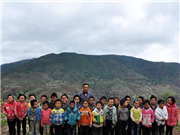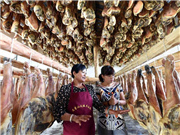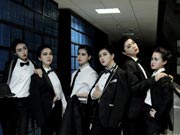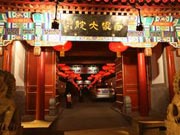

BEIJING, March 3 -- Unfazed by downward pressure on economy, China's top political advisor Yu Zhengsheng pledged Tuesday further efforts to help advance reforms at the start of the most important two weeks on China's political calendar this year.
Presenting a work report of the Standing Committee of the Chinese People's Political Consultative Conference (CPPCC) National Committee at the opening meeting of its annual session, Yu said the CPPCC should put the "Four Comprehensives" at the center of its work.
He was referring to a political concept initiated by Chinese President Xi Jinping, which comprises comprehensively building a moderately prosperous society, deepening reform, advancing the rule of law and strictly governing the Communist Party of China.
Reform is a recurring keyword throughout Yu's report, in which he looked back on the national political advisory body's work last year and set new goals for 2015.
In the past year, national political advisors rallied support and energy for comprehensively deepening reform, Yu said.
They should continue to stick to the reform agenda this year, he told fellow advisors who will spend the next few days reviewing a government work report, among others, that would comb through reform measures undertaken in 2014 and set the tone for this year's economic plan.
The political advisors' gathering runs almost in parallel with the annual session of the National People's Congress, the country's top legislature, which runs from March 5 to March 15 this year.
The two meetings, together dubbed the two sessions, make the most important annual political events in China, where political and economic developments are discussed and key policies adopted.
Although there are no major government appointments on this year's agenda, the meetings are set to be closely watched, as decisive reforms launched last year gave them extra heavy footing.
Defining the year 2015 as "a critical year for comprehensively deepening reforms, the opening year for advancing the rule of law in an all-round way and the final year for completing the 12th Five-year Plan," Yu said the CPPCC should focus their suggestions and proposals on reform and development.
Facing looming downward pressure on the world's second largest economy, Chinese leadership has pinned much hope on decisive reforms in hope of more healthy and effective growth which has slowed down to a stage of "new normal" -- the economy grew at its lowest pace in 24 years, expanding by 7.4 percent.
China saw a fiscal reform program designed to improve the taxation and local government financing systems within two years, the liberalization of the household registration system, and revisions to lending interest rates which gave commercial banks more freedom.
The government also abolished registered capital and administrative registration requirements for new businesses, and slashed red tape blamed for stifling private investment.
Yu noted that most of the CPPCC consultative activities and inspections, surveys and studies last year focused on deepening reform.
In particular, political advisors offered suggestions on key issues such as judicial independence, government transparency, air pollution prevention and control as well as structural optimization of economy.
In 2015, political advisors should deliberate and make suggestions on the formulation of China's 13th Five-year Plan, and strive to make farsighted, strategic and targeted suggestions and proposals, Yu said.
He said that the CPPCC will also conduct thorough investigations and studies on key topics, such as the Belt and Road initiatives and air pollution in the Beijing-Tianjin-Hebei region, to provide reference materials for the Party and the government in their decision making.
The 16-page report also drew multiple references to the rule of law.
The CPPCC will seek to actively contribute ideas and energy to comprehensively advance the law-based governance, by exercising democratic oversight over unfair or lax law enforcement, Yu said.
Seen as a major manifestation of socialist democracy, the CPPCC serves to conduct political consultation, exercise democratic supervision and participate in the discussion and the handling of state affairs.
POSITIVE ENERGY
Most CPPCC members are experienced political figures, entrepreneurs, experts and scholars specializing in various fields, or celebrities.
The CPPCC image, however, has been somewhat tarnished by a series of corrupt scandals unveiled in a sweeping anti-graft campaign spearheaded by the central leadership.
Yu said 14 people have so far been expelled from the 12th CPPCC National Committee since 2013.
They include two vice chairmen of the CPPCC National Committee, Ling Jihua and Su Rong, who have been suspected of corruption and investigated accordingly.
Su is now being investigated by the Supreme People's Procuratorate over allegations of accepting huge bribes for promoting his inferiors, among others. A CPPCC meeting last month removed Ling from the post of National Committee vice chairman and stripped him of his CPPCC membership.
Although most of their violations did not occur during their tenure as leading national political advisors, the cases have nonetheless affected the image of the CPPCC, Lyu Xinhua, spokesman for this year's CPPCC National Committee, said on Monday, adding that the national political advisory body is no harbor for corrupt officials.
Yu also called on political advisors to take this as a warning, improve Party conduct, uphold integrity and combat corruption.
Meanwhile, further efforts should be made to bring together "positive energy for achieving the great rejuvenation of the Chinese nation," Yu said, calling on the political advisors to strengthen ties with ethnic minorities and religious groups to combat poverty and promote development.
They should also uphold the principle of "one country, two systems" and the basic law of the Hong Kong and Macao special administrative regions, and contribute to deepening exchange and cooperation between the mainland and the two regions.
BETTER CONSULTATION
Achievements aside, Yu also admitted that there are still room for for improvement for the CPPCC's work.
"Its democratic oversight work still needs strengthening, its institutions and systems still need improvement, the quality of its proposals still needs to be raised, and its ability to perform its functions can be further increased," Yu said.
To this end, the top political advisor dedicated a special section to advancing China's "consultative democracy."
The effectiveness of the CPPCC's consultative democracy can be further improved by selecting the right topics, conducting in-depth surveys and studies and applying research results into practice, Yu said while insisting that political advisors must correctly understand the nature of CPPCC consultative democracy.
They must uphold the leadership of the CPC, "never indiscriminately copy other country's political models, and keep to the path of political development with Chinese characteristics," he said.
The channels through which all sectors of society could participate systematically in political consultation should be expanded and a democratic atmosphere for consultations and discussions be created, Yu said.
Democratic oversight of the CPPCC will also be strengthened, Yu said, with special focuses on defusing local government debt risks, increasing the government's credibility, and implementing the CPC Central Committee's eight-point frugality rules.
He especially noted that the Chinese political advisors hosted 19 biweekly consultation symposiums last year to invite members from various fields and backgrounds to discuss and propose ideas on issues such as over-capacity and water quality protection at the sources of the central route of the South-to-North Water Diversion project.
 |
Day|Week

 Tsinghua junior makes over 10,000 yuan a day by selling alumnae's used quilts
Tsinghua junior makes over 10,000 yuan a day by selling alumnae's used quilts Graduation photos of students from Zhongnan University
Graduation photos of students from Zhongnan University A school with only one teacher in deep mountains
A school with only one teacher in deep mountains Glimpse of cultural heritage "Xilankapu"
Glimpse of cultural heritage "Xilankapu" Homemade cured hams in SW China
Homemade cured hams in SW China Breathtaking buildings of W. Sichuan Plateau
Breathtaking buildings of W. Sichuan Plateau Graduation photos of "legal beauties"
Graduation photos of "legal beauties" Top 10 most expensive restaurants in Beijing in 2015
Top 10 most expensive restaurants in Beijing in 2015